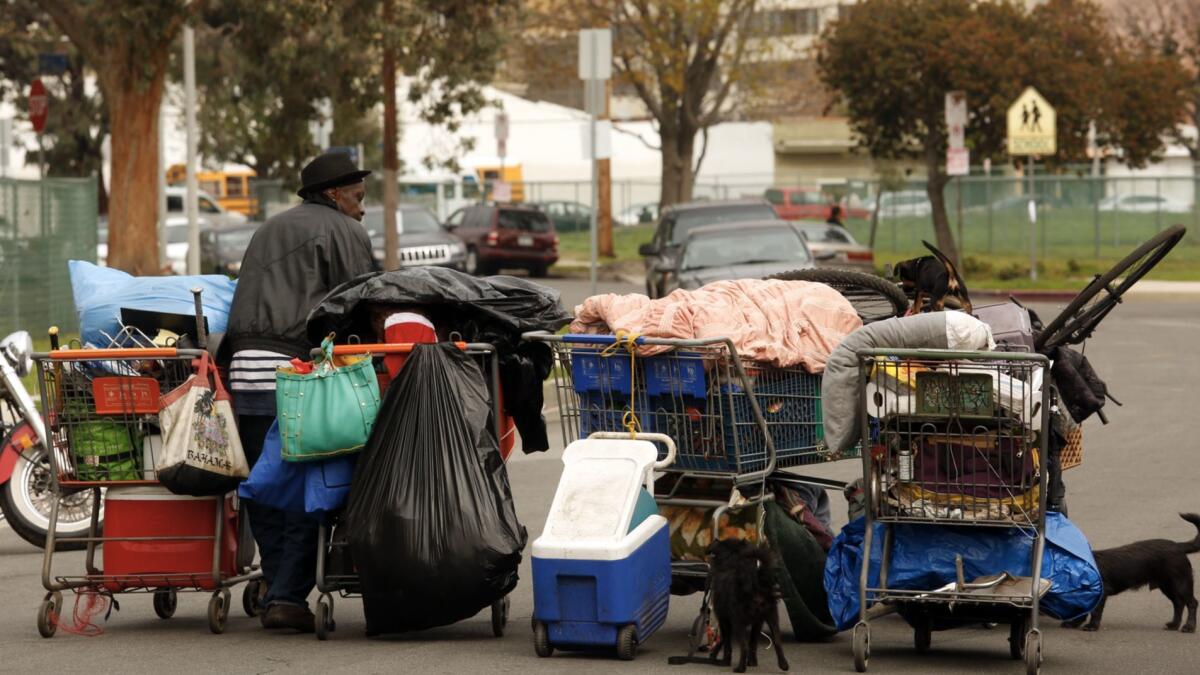Editorial: Last November, L.A. overwhelmingly voted to end homelessness. Don’t let Measure S undermine that effort

- Share via
In November, three out of four voters in the city of Los Angeles agreed to raise taxes to build homeless housing. The overwhelming support for Measure HHH, which authorized $1.2-billion in bonds to construct 10,000 units of housing for homeless and very low income people, sent a clear message: Angelenos want to end the city’s homeless crisis, and they’re willing to pay to make it happen.
Now, Measure S on Tuesday’s ballot could not only undermine the passage of HHH, but reverse the city’s progress toward ending homelessness. Because of the land-use restrictions in Measure S, some low-income and homeless housing projects would be blocked for two years, others would be stopped altogether, and still more projects could become prohibitively expensive to build because the initiative limits the city’s ability to reduce the number of required parking spots.
Measure S is a slow-growth, anti-development ballot measure that purports to reform Los Angeles’ broken land use and development system. The best policy within the initiative — requiring the city to update its General Plan, which is the blueprint for growth, and the 35 community plans — is already being adopted by the City Council. What’s left in the initiative are restrictions that constrain development. Proponents of Measure S may not have intended to throw up roadblocks for HHH-funded homeless and very-low income housing, but that will be the effect if the measure passes.
The initiative would impose a two-year moratorium on all real estate projects that require a General Plan amendment, zone change or increase in allowable height — land-use changes that are fairly common for the type of housing projects that HHH would help fund. In addition, Measure S would enact a permanent ban on General Plan amendments for any property less than 15 acres, all but ruling out projects that do not match the specific land uses that the plan assigns to city properties.
Although the measure would exempt some 100% affordable projects from the two-year moratorium, those that require a General Plan amendment would still be barred. Last year the city identified a dozen underused publicly owned properties, including parking lots, a maintenance yard and an old animal shelter, that could be developed into housing for the homeless. Ninety percent of the sites would require a General Plan amendment, so they would be permanently barred by Measure S. The same is true for many other potential sites, from shuttered fire stations and warehouses to vacant lots.
In addition, Measure S would limit the city’s ability to reduce the number of parking spots required for a new building. Developers of housing for homeless, very low-income and senior residents often seek permission to provide fewer spots because fewer of their residents drive, and each new parking spot can raise costs up to $30,000. Under Measure S, these projects would have to provide unnecessary and expensive parking, making it even more difficult to stretch HHH dollars.
Surely, this is not what 77% of voters intended when they passed Measure HHH. Vote no on Measure S.
Follow the Opinion section on Twitter @latimesopinion and Facebook
More to Read
A cure for the common opinion
Get thought-provoking perspectives with our weekly newsletter.
You may occasionally receive promotional content from the Los Angeles Times.










